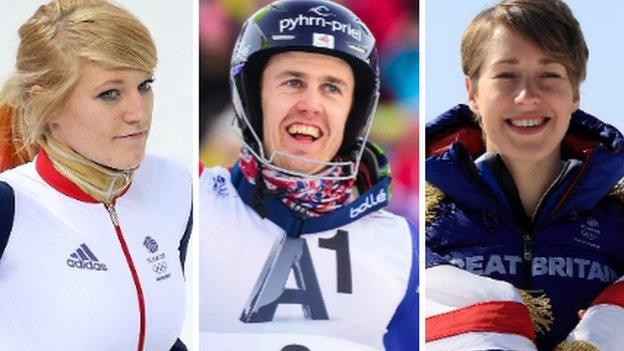Elise Christie: How Steven Bradbury's incredible story could inspire GB skater
- Published
Christie crashes out again
XXIII Olympic Winter Games |
|---|
Venue: Pyeongchang, South Korea Dates: 9-25 February |
Coverage: Watch live on BBC TV, Red Button, Connected TVs, BBC Sport website and mobile app. Full coverage times |
Onlookers could only wince, grimace and sympathise with British medal hope Elise Christie as she failed in her fifth consecutive Olympic short track race on Saturday - injuring her ankle in the process.
But is her run of crashes and disqualifications down to bad luck, poor tactics, or just the sheer brutality of the sport?
Australian Steven Bradbury, watching from his home in Brisbane, knew exactly what the three-time world champion was going through.
He suffered disqualifications at two consecutive Games and had to overcome a broken neck and losing four litres of blood on the ice.
Yet he was able to recover from all that to win what is now dubbed as the 'luckiest' gold medal, external in Winter Olympic history.
"People in the sport understand the nature of short track and situations like this, as Elise has found out, are common," said 44-year-old Bradbury.
"You have to think that there's an upside to come for her. There just has to be. Her ability is incredible.
"She's not the smartest racer in the world, that's a given. Sometimes she does dumb things out there on the ice and puts herself in positions that she doesn't need to.
"But her story is one of more bad luck than I've ever seen in the sport. And for me, I've had my share of bad luck."
Last man standing! Bradbury wins incredible gold in 2002 as the leaders crash out
Blood, broken neck and then redemption - Bradbury's story
Bradbury's eventful journey across four different Games goes some way to depicting the volatile and risky nature of the sport, which appears to have treated Christie the same way at Olympic level.
Bradbury became one of Australia's first Winter Games medallists after winning bronze in the 5,000m team relay in Lillehammer in 1994, but he was twice taken out in the individual events.
Then came the first of two horrific injuries at a World Cup event in Montreal.
"I landed on the back of another guy's blade in Canada," he said. "A person of my size has five and a half litres of blood and I lost four of them in 60 seconds."
After needing stitches in his leg wound, Bradbury returned to the ice to compete at the 1998 Winter Olympics in Nagano.
But on his next chance at redemption, a new problem arose.
"I was in the top 10 in the world but I had the worst case of food poisoning in the world before my 1,000m event. I skated but I'd been throwing my guts up for two days and I didn't even look at the result."
Two years later, and 20 months before the next Olympics began in Salt Lake City, Bradbury suffered a training accident that nearly ended his career.
"I went head first into the barrier and broke my neck. I had a halo brace screwed into my skull. I had two and a half months in that thing and I had time to think about the big picture, what I'd done in the sport and what I had ahead of me.
"My doctor told me I'd never skate again, so I just went to another doctor.
"In my head, I had no choice but to finish what I'd started."
Bradbury's luck finally came in Salt Lake City.
In the 1,000m quarter-finals, he watched Canadian defending world champion Marc Gagnon get disqualified for obstruction, meaning Bradbury progressed in his place.
In the semi-finals, the Australian loitered near the back of the pack and avoided a huge pile up which took out all the favourites and he made the final.
In the medal race, he opted to stay out of danger again.
"My coach said to me, 'you're not as good as these other blokes, just go out there and stay out of the way and you'll probably pick up a bronze'," said Bradbury.
"Obviously it worked out a little better."
Bradbury was off the pace going into the last lap of the final. But, in true short track style, another huge crash on the final corner left his opponents skittled across the ice and Bradbury survived to win Australia's maiden Winter Olympic gold.
"Sometimes it's a little bit hard to swallow, how I won the gold - but I was the guy in that fortunate position. I'm probably the luckiest Olympic gold medallist in history."
'Christie deserves a gold before she finishes'
Britain's Christie suffered three disqualifications in Sochi and has racked up two further disappointments in Pyeongchang. Having won her heats with ease, she crashed in the 500m final on Tuesday and the 1500m semi on Saturday.
The 1,000m, which starts on Tuesday, is her only hope of securing that elusive medal this time round. And she is fighting to be fit for the qualifiers after picking up soft tissue damage to her ankle.
So how much will Christie's final attempt at a medal be down to luck?
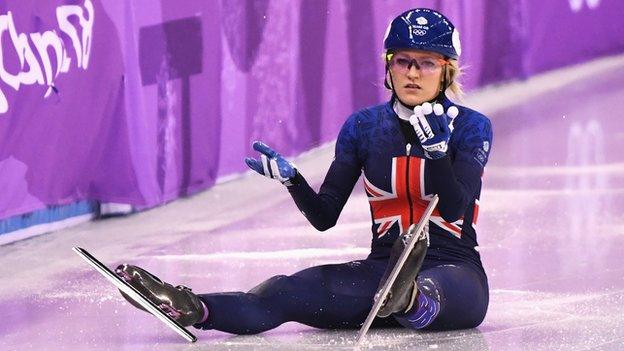
Elise Christie has only the 1,000m event remaining in Pyeongchang
"The sport is incredibly unpredictable and the favourites lose more than they win. You never know what the result is going to be," said Bradbury.
"The unpredictability of short track worked in my favour and, unfortunately for Elise Christie, she's been on the other end of that.
"Some of the disqualifications in Sochi were her fault, but some of them were 50/50s. They could have gone the other way but they just didn't.
"Her tactical skating has improved and it can't be long before she wins a medal. She deserves a gold before she finishes the sport."
Some have questioned Christie's mental strength to compete under pressure at the Olympics.
The 27-year-old admitted she struggled to cope with her disqualifications at Sochi, and the social media abuse she received afterwards.
But Christie showed her mettle when she won three world titles in 2017, before once again being reduced to tears by her sport in South Korea.
"For people to say Elise can't perform in the Olympics because of the pressure is wrong," said Bradbury.
"It's what you've trained for. To go to the Olympics with the whole country - the whole world - watching, it's what an athlete loves.
"It really is amazing the sort of power that you can draw on when you're put into that sort of life and death situation.
"You've just got to be positive - even if you've had your blood spill over the ice."
- Published23 February 2018
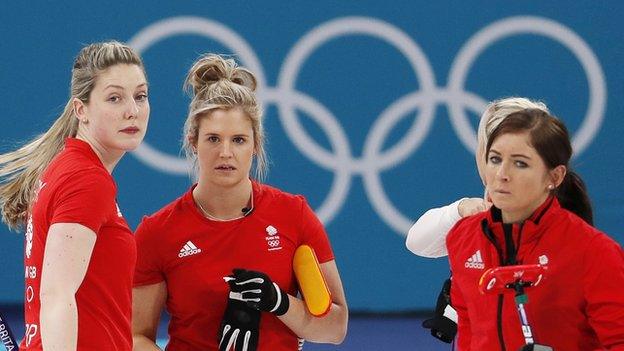
- Published19 February 2018
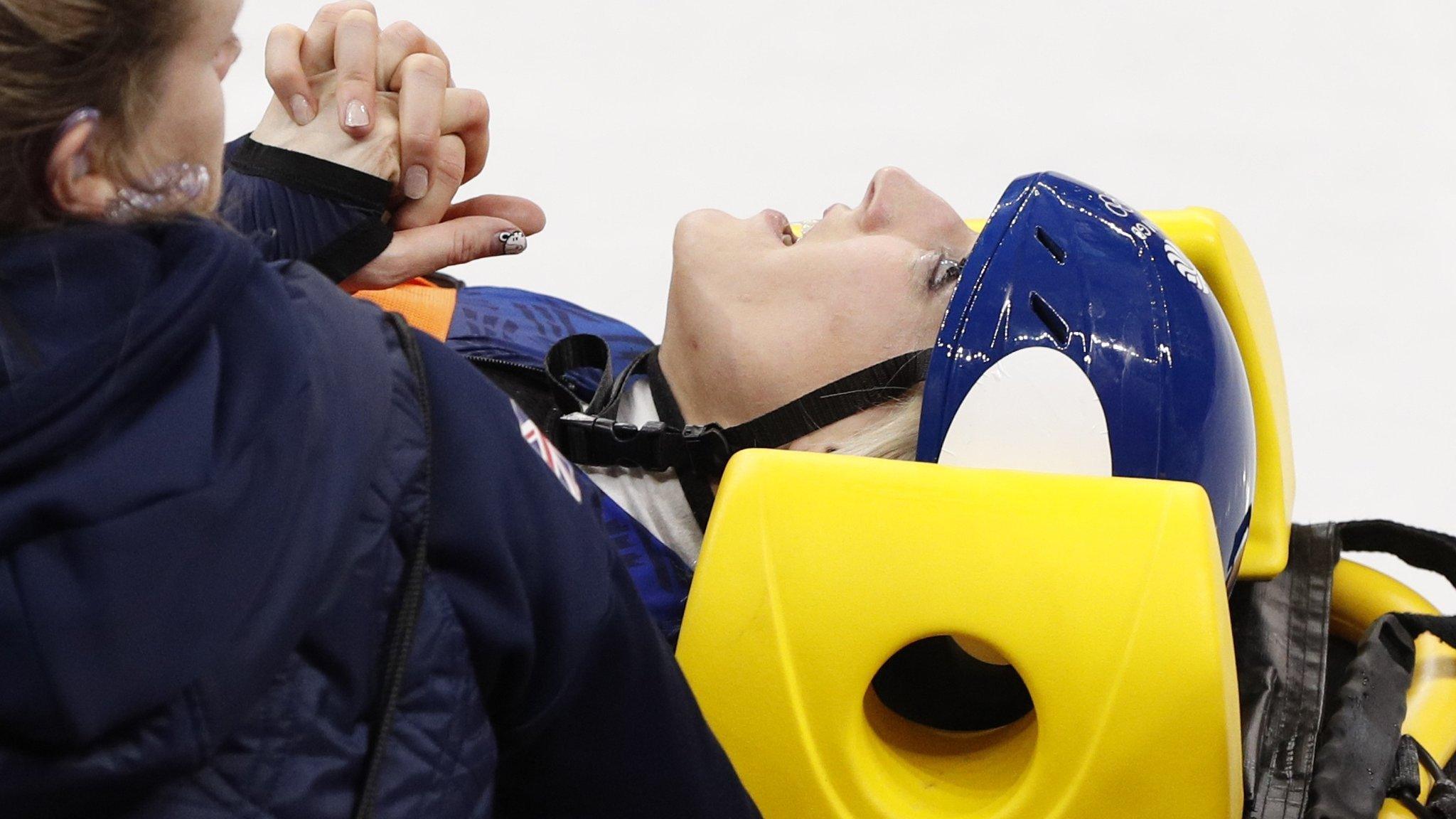
- Published22 February 2018
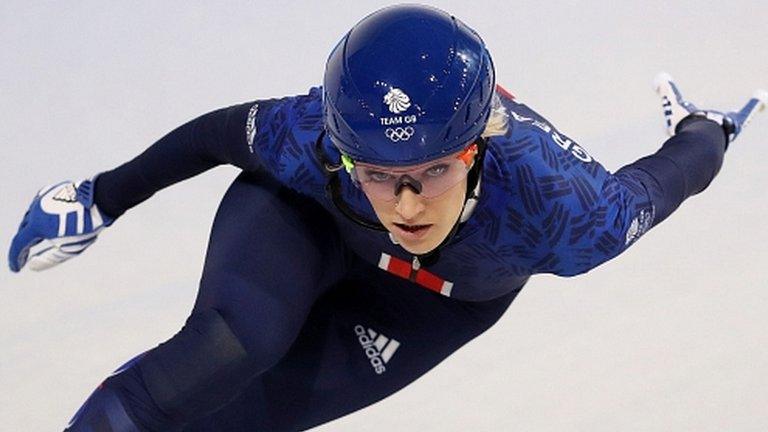
- Published24 February 2018

- Published8 February 2018
